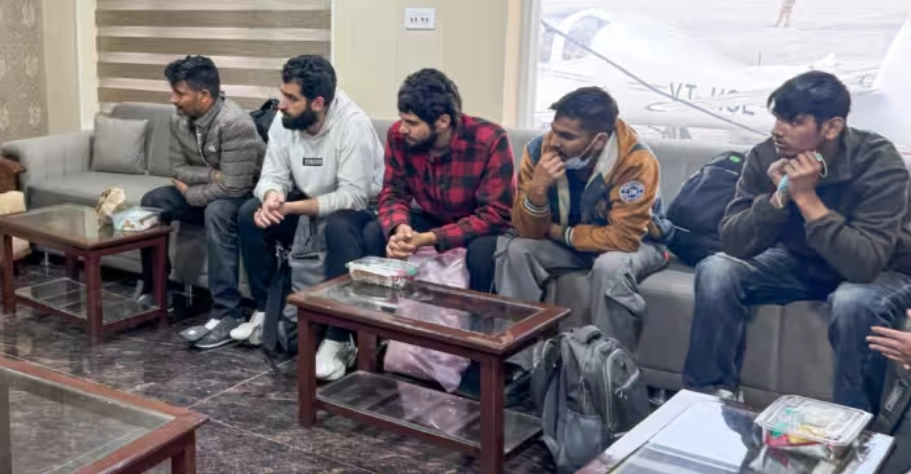 Deportees From the US Arrive in India: Over 100 Indians deported from the US this week have alleged they were handcuffed and shackled during their 40-hour journey back to India. Many claimed they were unaware of their deportation until they arrived in Amritsar on Wednesday.
Deportees From the US Arrive in India: Over 100 Indians deported from the US this week have alleged they were handcuffed and shackled during their 40-hour journey back to India. Many claimed they were unaware of their deportation until they arrived in Amritsar on Wednesday. Harwinder Singh, who hails from Tahli village in Hoshiarpur, shared his ‘harrowing’ experiences on the donkey route to the US in August last year. Recounting the dangers he faced, Singh said he witnessed one person die in the Panama jungle and another drown in the sea.
He revealed that he was taken through multiple countries, including Qatar, Brazil, Peru, Colombia, Panama, Nicaragua, and Mexico, before attempting to cross into the US. "We crossed hills. A boat, which was taking me along with other persons, was about to capsize in the sea, but we survived," he told reporters.
He alleged that his travel agent had initially promised a route through Europe before reaching Mexico but instead subjected him to a treacherous path. Singh claimed to have spent ₹42 lakh for the journey.
"Sometimes we got rice. Sometimes, we did not get anything to eat. We used to get biscuits," he said, describing the extreme hardships he faced before being captured by US authorities and sent back to India.
A deportee from Punjab detailed the perilous journey, used by human smugglers to transport migrants to the United States.
"Our clothes worth ₹30,000-35,000 were stolen on the way," he said, describing the hardships faced during the trip.
According to him, the group was first taken to Italy before being moved through Latin America. The journey included a gruelling 15-hour boat ride, followed by a trek of 40-45 kilometres on foot.
"We crossed 17-18 hills. If one slipped, then there would be no chance that he would survive... We have seen a lot. If anybody got injured, he was left to die. We saw dead bodies," he added.
The deported individuals were subjected to questioning inside the airport terminal by multiple government agencies, including the Punjab Police and various state and central intelligence units. Authorities conducted background checks to verify if any of them had a criminal record.
Another migrant, Robin Hanada regretted using the donkey route, saying, "I will never suggest anyone to take this route…The conditions there are so harrowing that right now I am not in a position to say anything."
Of all 104 deportees, 33 each were from Haryana and Gujarat, 30 from Punjab, three each from Maharashtra and Uttar Pradesh, and two from Chandigarh, sources told PTI.
Jaspal Singh, a resident of Hardorwal village in Punjab’s Gurdaspur district, recounted his ordeal, he said he was apprehended by the US Border Patrol on January 24 after being tricked by a travel agent who had promised legal entry into the country.
"I had asked the agent to send me through a proper visa. But he deceived me," Jaspal said, adding that he had paid ₹30 lakh for the process.
According to Jaspal, he first reached Brazil by air in July last year, believing that the rest of his journey to the US would also be by flight. However, he alleged that the agent forced him to cross the border illegally. After spending six months in Brazil, he entered the US, only to be arrested by border authorities. He was held in custody for 11 days before being deported.
Jaspal claimed he was unaware of his deportation until he landed in India. "A huge sum was spent. The money was borrowed," he said, expressing his devastation over the forced return.
His cousin, Jasbir Singh, said the family only learned about his deportation through the media on Wednesday morning.
On reports of using ‘restraints’ on migrants during deportation, External Affairs Minister S Jaishankar said that it is the ‘standard procedure’ used by American agency Immigration and Customs Enforcement (ICE) aircraft since 2012.
Making a statement in the Upper House, Jaishankar said, "However, we have been informed by ICE that women and children are not restrained...Further, the needs of deportees during transit related to food and other necessities, including possible medical emergencies are attended to," he informed the Rajya Sabha adding that the deportees are temporarily unrestrained during toilet breaks.
Among the deportees were 19 women and 13 minors, including a four-year-old boy and two girls, aged five and seven, reported PTI.